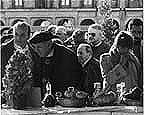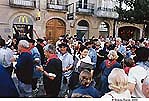| Photo (Thumbnail) |
Vocabulary Items |
Topics |
Grammar Points |
|

|
Restaurant;
customers, waitress, terrace, table, chair; |
types of restaurants |
verbs ukan, izan, egon, modal expresions, adjectives, nouns |
 |
Terrace, square, table, chairs; |
people, customers, ask for, order; |
adjectives, comparatives, present tense, future tense, prepositions; |
|

|
bar, client, plate, glass;
food, drinks, people; |
lunch time, snack time; |
Present tense, prepositions, adjectives, nouns |
|

|
City, buildings, old, stones; |
historic, traditions, customs, market; |
adjective, number, gender agreement; |
|

|
Ancient , walls, people, building, piers, to visit, visitors, century, historic; |
tourism, historic, architecture; |
adjectives, locatives;
behind, above, etc.;
past tense, gender, numbers; |
|

|
to sell, to buy, market, square, gathering ; |
architecture, historic, location, geography; |
present tense/present continuos/aspect; |
|

|
table, cheese, vendors, buyers, cheese-maker, knife, village people, table-cloth; |
region, custom, history, geography |
order, number, noun/adjective agreement, compartive, tense/aspect; |
 |
Sunday market, gathering, old men, basque bonet, oil, vinager, food products, |
City life, festivals, traditions; |
adjectives, plural, spatial relation, locatives; |
|

|
view, live in town, social gatherings, competition, win, ; |
Traditional life, historic; |
adjectives, comparatives;
Pronouns, number; |
|

|
vegetables, diet, grow vegetables, types, food products, village life; |
village life ;
|
motion verbs, locatives, tense/aspect;
prepositions; |
 |
Santiago day celebration, buildings, ancient, tower, church, old city, old women;
holiday, visit, tourism; |
Religion, celebrations; |
constructions, number, how many, plural; |
|

|
garlic market, food products, basque cuisine ingredients, cook, to cook;
|
Street markets; |
prepositions |
|

|
shopping, festivities, vegetable types; |
Shopping |
number, adjectives, prepositions, measurements |
|

|
cheese, cheese makers, farmers, cows, sheeps, rural economy; |
rural economy; |
ukan, izan, egon, adjectives, prepositions |
|

|
rural houses;
courtyard, path, stone, roof; |
architecture, history, design, materials |
number, prepositions, adjectives; |
|

|
wood work, decorative, flowery, beautiful, structure, direction, size; |
Architecture, color, pattern, style; |
Noun/adjective agreement; |
|

|
folklore, dance, men, women, celebrations; |
Traditions;
music, musical instruments; |
Adjective, nouns, sentence structure; |
|

|
Gazteziko Jaiak " La Blanca", folklore, dance, men, women, celebrations; |
Traditions;
music, musical instruments; |
Adjective, nouns, sentence structure; |
|

|
Gazteizko Jaiak " Blusa Veterano Eguna", folklore, dance, men, women, celebrations; |
Traditions;
music, musical instruments; |
Adjective, nouns, sentence structure; |
|

|
rural house;
light, color, form, line, style, courtyard; |
History, rural, tourism; |
adjectives; |
|

|
goats, goat-cheese, cheese-maker, land, gate, visitors; |
tradition, rural economy; |
number, motion verbs, ; |
|

|
street, square, people, children, visitors, tourists, residents, weekend; |
city, architecture, window, balcony,gathering; exchange, talk, speak season; |
adjectives, number, action verbs, present; |
|

|
Go out, bar, restaurant to talk to, to talk about, to dance, to eat, to drink, to speak, to play, types of drinks, friends, windows, wood, street, teenager, young, house, house door, street numbe;
|
Social activities;
Weekend activities, week-days activities |
Adjectives, verbs egon, ibili, ukan, izan
Present and Past tense; |
|

|
To cook, to put, to prepare, to order, to divide, to place, kitchen, to celebrate, diploma, to graduate, Gastronomy-School, students, clothing, cooking utensils ;
|
Education-Gastronomy-School |
Gender, number, color, How many? - students; |
|

|
To eat, types of snacks, " patata tortilla", beer, waiter, client, snack time, happy, hungry, thristy, to smile, to laugh, moustache, glasses, to wear, jacket;
|
"Hamaiketako"-traditions, customs; |
Present continuos tense;
Prepositions, adjectives, present tense; |
|

|
To celebrate, appetizers, snacks, meetings, food, olives, chips, sausage, chorizo, crackers, table, table-cloth, onions, pickles, wines, cocktails, napkins, wine glasses;
|
Celebration; |
Adjectives, numbers, quantities, prepositions,colors, gender; |
|

|
To celebrate, appetizers, snacks, happy, friends, friendship, food, olives, chips, sausage, chorizo, crackers, table, table-cloth, onions, pickles;
|
Celebration; |
Adjectives, numbers, quantities, prepositions,colors, gender; |
|

|
food products, milk products, milk, cheese, yogurt, shopping, diet, urban;
|
Shopping, supermarket, cooperatives; |
colors, nouns, verbs (buying, selling); |
|

|
eggs, farm, chicken, farm products, rural economy, type, size; |
number, size, type, measurements;
|
action verbs, adjectives, verb tenses |
|

|
cheese, types, market; |
Traditional markets;
|
subject-adjective agreement; |
|

|
fruit, banana, apple, trees ; |
Food products |
number, adjectives, color;
how many; |
|

|
rice, beans, garbanzo beans, quality, region, quantity, color, cooking styles, recipes, |
Food products |
plural, measurement;
how much; |

































